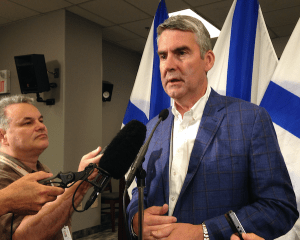Listen to Premier McNeil and Health Minister Delorey and you might imagine Inez Rudderham’s problems are specific and anomalous. Fix them and we fix the problem. The problem is McNeil and Delorey are the problem.

“To the premier of Nova Scotia, I dare you to take a meeting with me, and explain to me, and look into my eyes, and tell me that there is no health-care crisis in my province of Nova Scotia.”
It was probably too much to expect Premier Stephen McNeil to respond in any way other than with his usual bland, butt-covering bromides to Inez Rudderham’s heart-wrenching cri de coeur video about her own personal health care crisis:
- about the fact Rudderham’s family doctor had left, making her just one more among the more than 50,000 Nova Scotians without a family physician;
- about the fact she was turned away from under-staffed, over-worked emergency rooms three times over two years before someone finally ordered the exam that told her, in June 2018, she had stage three anal cancer;
- about the fact that two rounds of chemotherapy and 30 rounds of radiation on her pelvis later, she is “barren and infertile;”
- about the fact she is still only 33 and in menopause;
- about the fact she hasn’t been able to work during her treatments and now has had to sell her family home to make ends meet and support her four-year-old daughter;
- about the fact she asked, back in January, for mental health services to help her cope with all of this awfulness and just learned last week she finally has an appointment — for mid-July.

Premier Stephen McNeil did not commit to meeting with Rudderham as she had dared him to do in that viral Facebook video now viewed more than 2.5 million times in less than a week. He didn’t agree to look her in the eyes and tell her there is no health care crisis in Nova Scotia. He didn’t even bother to call her.
“I obviously feel for this person,’” he allowed to reporters. “I did see part of the video.” But instead of talking to her directly, facing the “face of the health care crisis” in Nova Scotia, McNeil hid behind the usual bureaucratic bafflegab.
“I’ve asked the department to reach out, to be in contact with her to find out the issues that she has and how we can best ensure that she gets the appropriate treatment but also the appropriate supports.”
Health Minister Randy Delorey sang from the same sorry hymnal: “I think, again, there’s some very specific concerns that were being raised about an individual’s personal experiences within the health-care system… I think the health authority’s taking the right approach to reach out, to connect … with the individual as they do and provide opportunities.”
All of which seemed to suggest Rudderham’s problems are specific and anomalous. Fix them and we fix the problem. Health care crisis? What health care crisis?
“There are challenges in the health care system in… access to primary care,” McNeil explained, sticking to his stale, a-challenge-is-not-a-crisis mantra. “We’ve always acknowledged that. But we’ve continued to make adjustments.”
Challenges, adjustments, no crisis, nothing to see here, folks…
Those who work inside the system, of course, know better.
So do those — like Inez Rudderham — who are failed by the health care system.
“Health care in Nova Scotia is in crisis,” correctly sums up Jason McLean, president of the Nova Scotia Government and General Employees Union, which represents the majority of health care workers in the province. “Everyone who works in health care knows it. Every person who tries to get health care knows it. Only the McNeil Liberals refuse to acknowledge it.”
Simply acknowledging the crisis won’t solve it, of course. The health care crisis in this province is complex and longstanding, and so multi-faceted it is hard to even wrap your head around.
But pretending there isn’t one makes it impossible to even begin the real work of addressing it.
This column originally appeared in the Halifax Examiner April 29, 2019.




 STEPHEN KIMBER, a Professor of Journalism at the University of King's College in Halifax and co-founder of its MFA in Creative Nonfiction Program, is an award-winning writer, editor and broadcaster. He is the author of two novels and eight non-fiction books. Buy his books
STEPHEN KIMBER, a Professor of Journalism at the University of King's College in Halifax and co-founder of its MFA in Creative Nonfiction Program, is an award-winning writer, editor and broadcaster. He is the author of two novels and eight non-fiction books. Buy his books